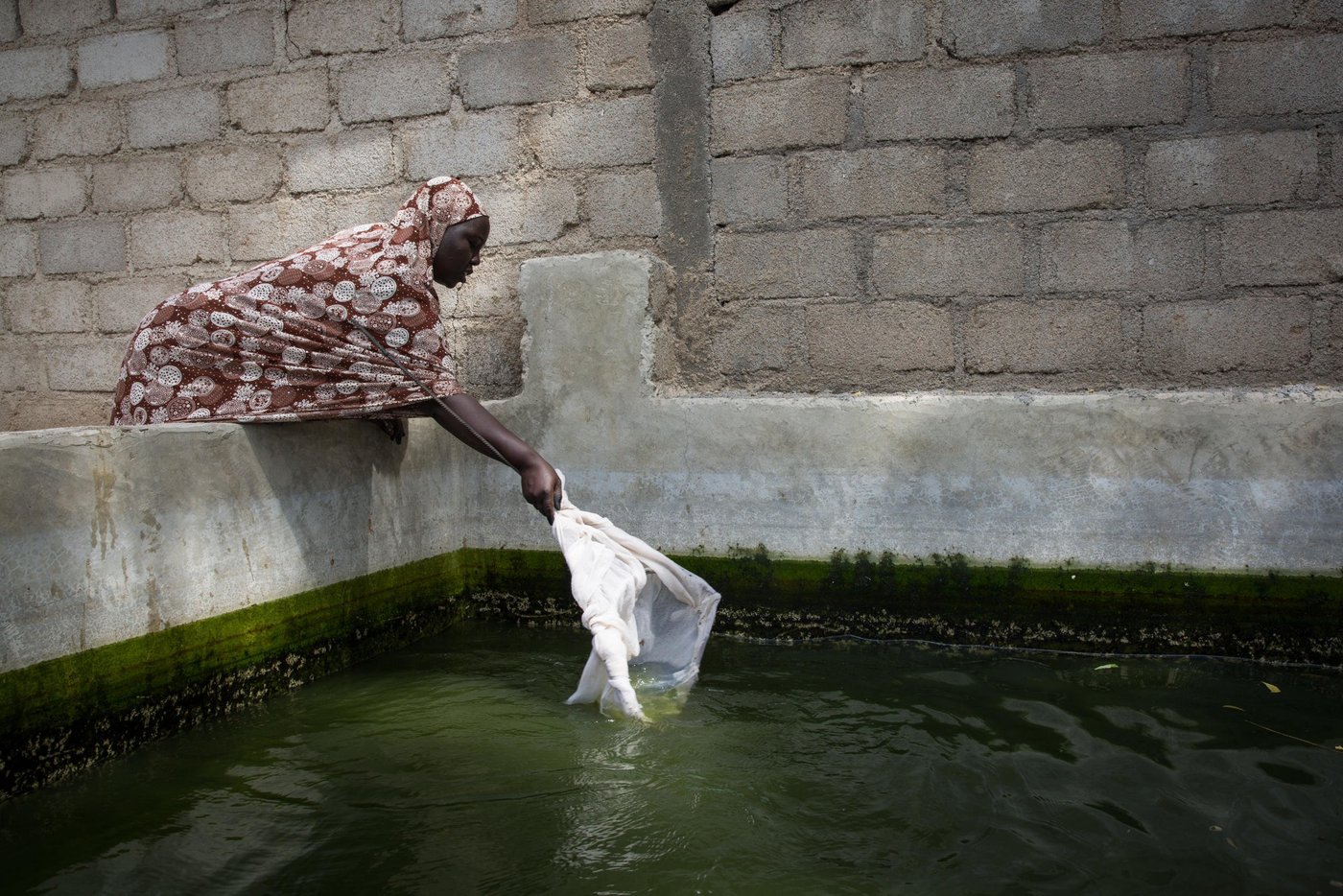Det er formiddag i Mora, og den nådeløse solen steker over de støvete gatene. Halima sitter i skyggen av et tre utenfor huset hun leier. Hun ser ned på en stor kurv fylt med peanøtter, fører hånden gjennom dem, og i en rask bevegelse griper hun en håndfull, fjerner skallene og kaster dem i en annen kurv.
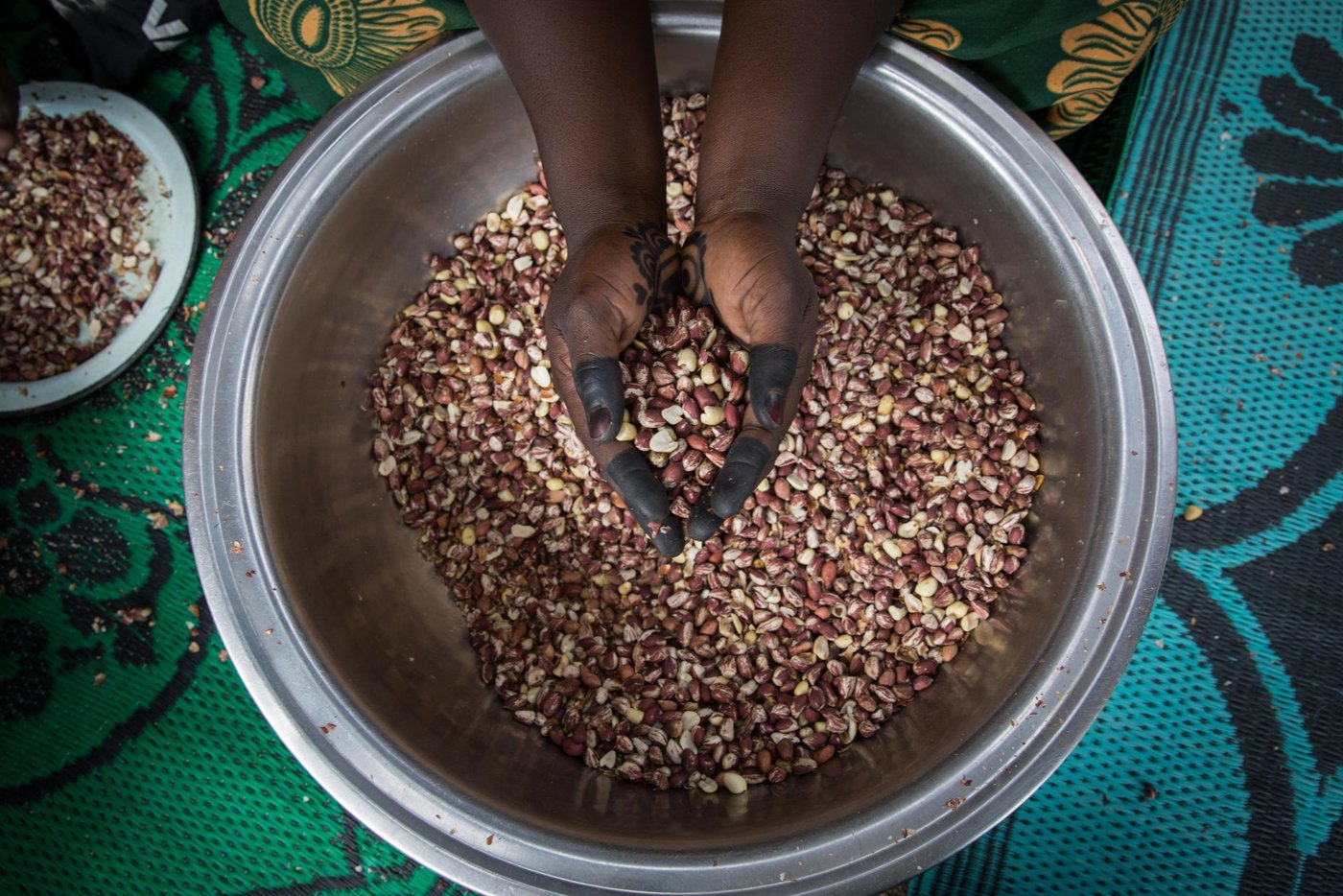
– Jeg er veldig glad nå, sier hun og smiler sjenert. – Alt det jeg ikke kunne ha før, det kan jeg ha nå.
Inntil nylig var Halimas liv ganske annerledes. For fem år siden flyktet hun med sine fire barn fra hjembyen Amchide da væpnede angrep og eksplosjoner gjorde livet der uutholdelig. Mannen hennes forsvant i kaoset. Fem år har gått, og hun har fortsatt ikke hørt fra ham. Hun frykter at han ble drept den kvelden.
Hun flyktet til Mora, en by bare 27 kilometer unna, men langt nok sør til å være trygg fra den konstante trusselen om vold. I Amchide jobbet Halima som syerske, men da hun flyktet i all hast måtte hun forlate symaskinen. Hun kom til Mora uten midler til å forsørge barna sine. Matutdelinger fra hjelpeorganisasjoner var det som reddet dem. Det var en tøff tid for Halima og barna.
Men livet skulle ikke forbli slik for Halima. Ting var i ferd med å endre seg. Og denne endringen ville ha alt å gjøre med fisk.
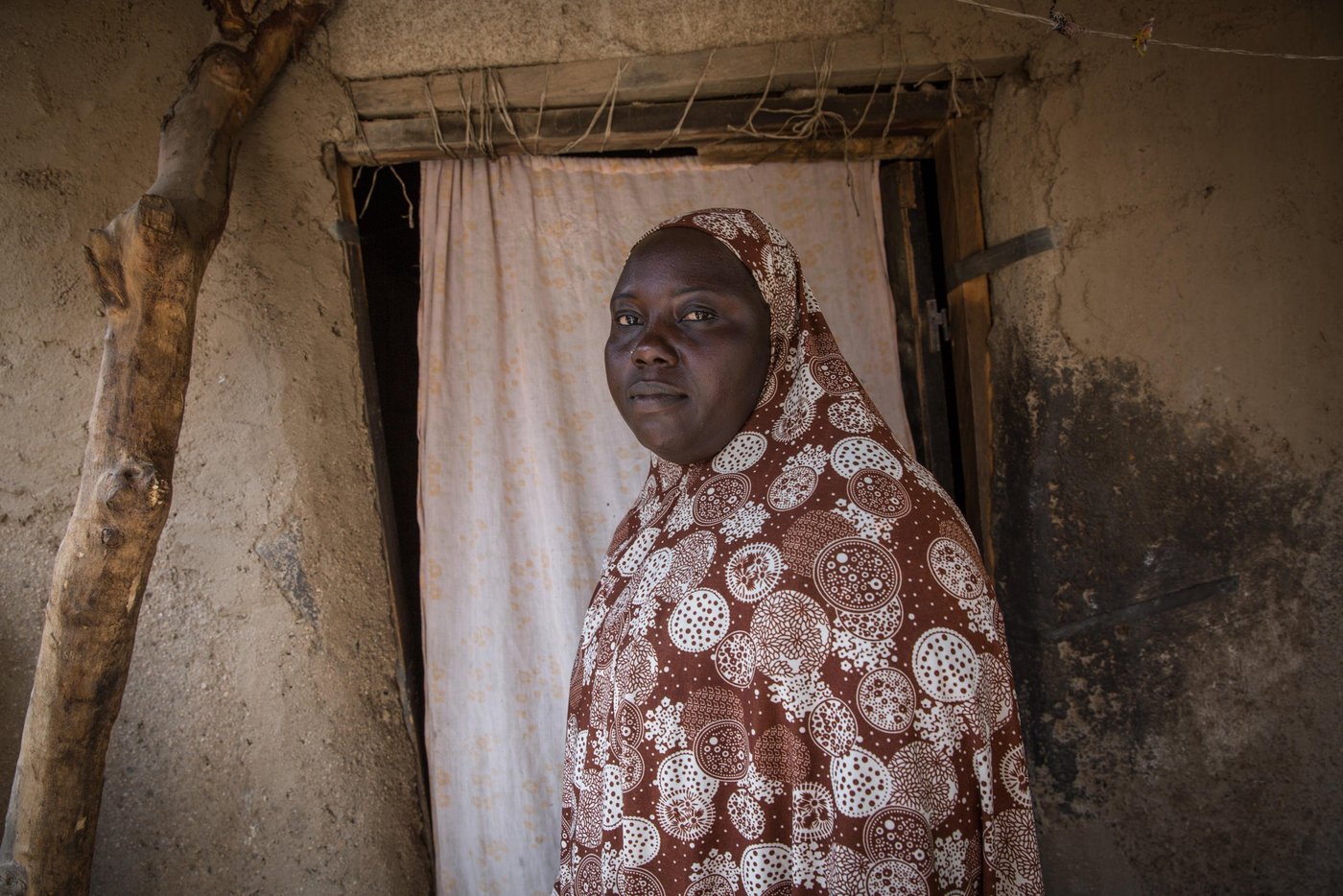
Eureka-øyeblikk
De nordlige områdene i Kamerun har et tørt og goldt klima i motsetning til det frodige, grønne landskapet man finner i mange andre deler av landet. Dette gjør det vanskelig å finne fersk fisk i byer som Mora. Med nærmeste innsjø 140 kilometer unna, blir fiskeselgere tvunget til å ta den lange reisen til innsjøen og tilbake for å selge fisken på de ukentlige markedene i Mora. Når fisken omsider kommer til landsbyen, har den lange reisen gjort fisken både dyr og langt fra fersk.
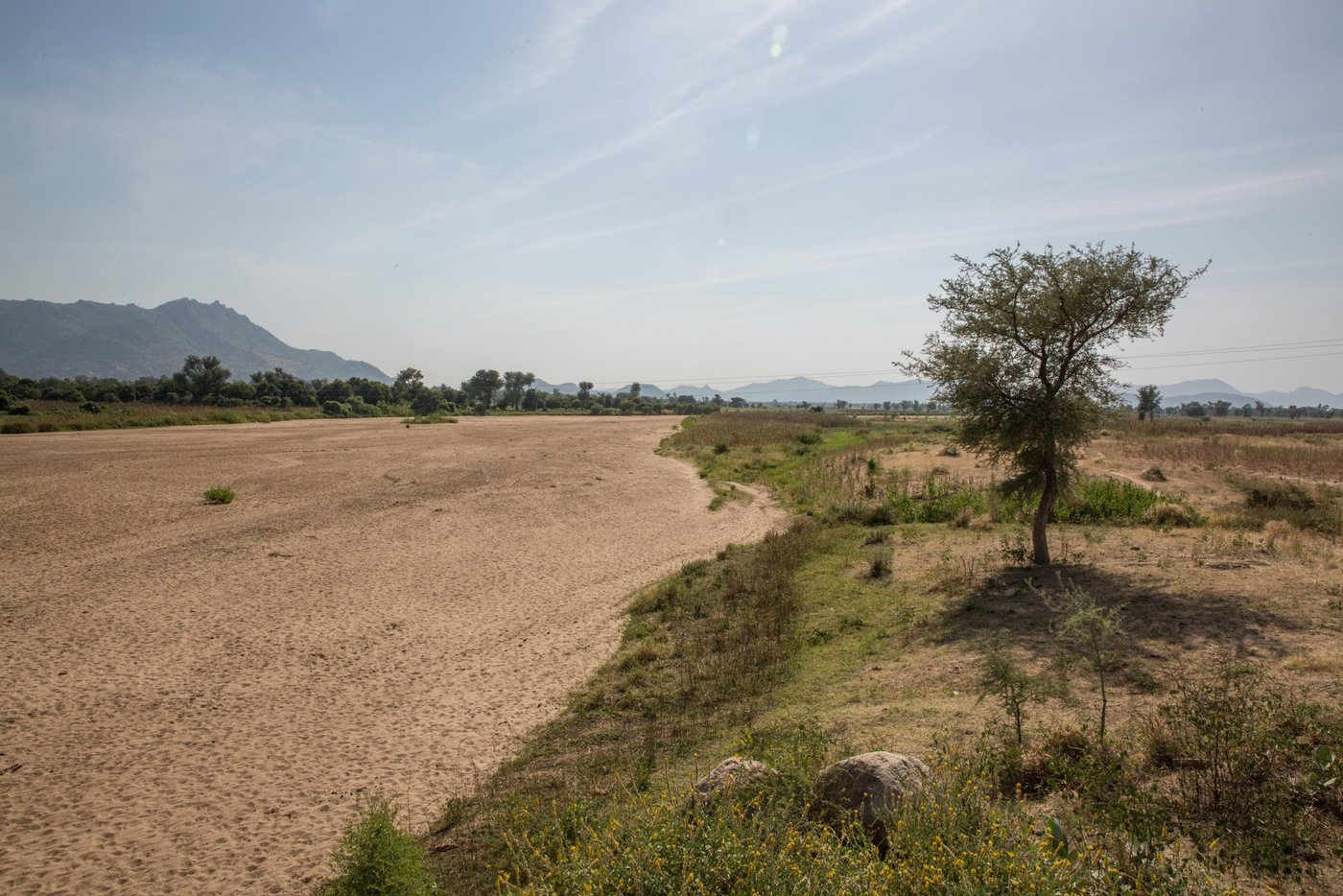
Det var med dette i tankene at Boucar Adji hadde sitt eureka-øyeblikk. Adji er en lokal gründer fra Mora som ønsket å starte en virksomhet som ville dekke etterspørselen etter fersk fisk, samtidig som han kunne hjelpe lokalsamfunnet til å blomstre.
![Boucar Adji, in front of the fish ponds.
Cameroon’s Far North Region has a dry and arid climate in contrast to the lush, green landscapes of many other parts of the country. This makes finding fresh fish in towns like Mora quite a challenge. With the nearest body of water, Lake Maga, 140 Km away from Mora, fish sellers are forced to make the long journey there and back to sell fish in Mora’s weekly markets. However, these transportation costs would force sellers to raise the price of fish to exorbitant amounts and by the time they arrived in Mora’s markets, they would no longer be fresh.
It was in this context that Boucar Adji, a native of Mora, had his eureka moment. Adji was an entrepreneur willing to start a business that would meet this demand for fresh fish in Mora, while also helping out his community. As Mora had become a host to thousands of displaced people from violence-hit parts of Cameroon, he wanted his business to primarily employ Mora’s newly arrived displaced people. His idea was to construct a small fishpond in Mora and raise fish there till the point where they were big enough to sell. He founded the Mora Fish Farming Association and accomplished exactly what he set out to do. Starting with one pond, he began to raise catfish within it and successfully sold these fish at a reasonable price in the markets in Mora.
As part of NRC’s efforts to improve the food security of displaced people in Cameroon, we provide financial support to local businesses, associations and cooperatives already engaged in efforts to accomplish this. When our teams in Mora came across the association that Boucar Adji had founded, we were excited to partner with him. As Leila Hommal, Food Security and Livelihoods Assistant for NRC Cameroon says, ‘we knew that if we provided support to this association’s fish farming activities, the whole community would benefit. [Adji] was not simply waiting for different NGOs to come to the aid of his community. He already had a clear idea of how his association would help his own community. And so we wanted to provide support to this association.’ With the financial support that he received, Adji was able to expand his business. He built a second pond and hired assistants to help him clean the ponds and feed the fish. Halima and and Gona are two of these women.
Photo: Ingebjørg Kårstad/NRC
Text: Itunu Kuku](/cdn-cgi/image/width=1400,format=auto,fit=crop,height=934/globalassets/images/countries/cameroon/2020/the-ripple-effect/the-fish-farmer-1.jpg)
Oppdrett av malle
Adjis idé var å anlegge en liten fiskedam i Mora og drive fiskeoppdrett der til de var store nok til å selge. Med dette i tankene grunnla han Mora Fish Farming Association. Fra én enkelt dam begynte han med oppdrett av maller. Disse solgte han etterhvert til overkommelige priser på markedene i Mora.
Siden Mora hadde blitt det nye hjemmet for tusenvis av mennesker som hadde flyktet fra konfliktrammede deler av Kamerun, ønsket han at virksomheten hans først og fremst skulle ansette disse nyankomne.
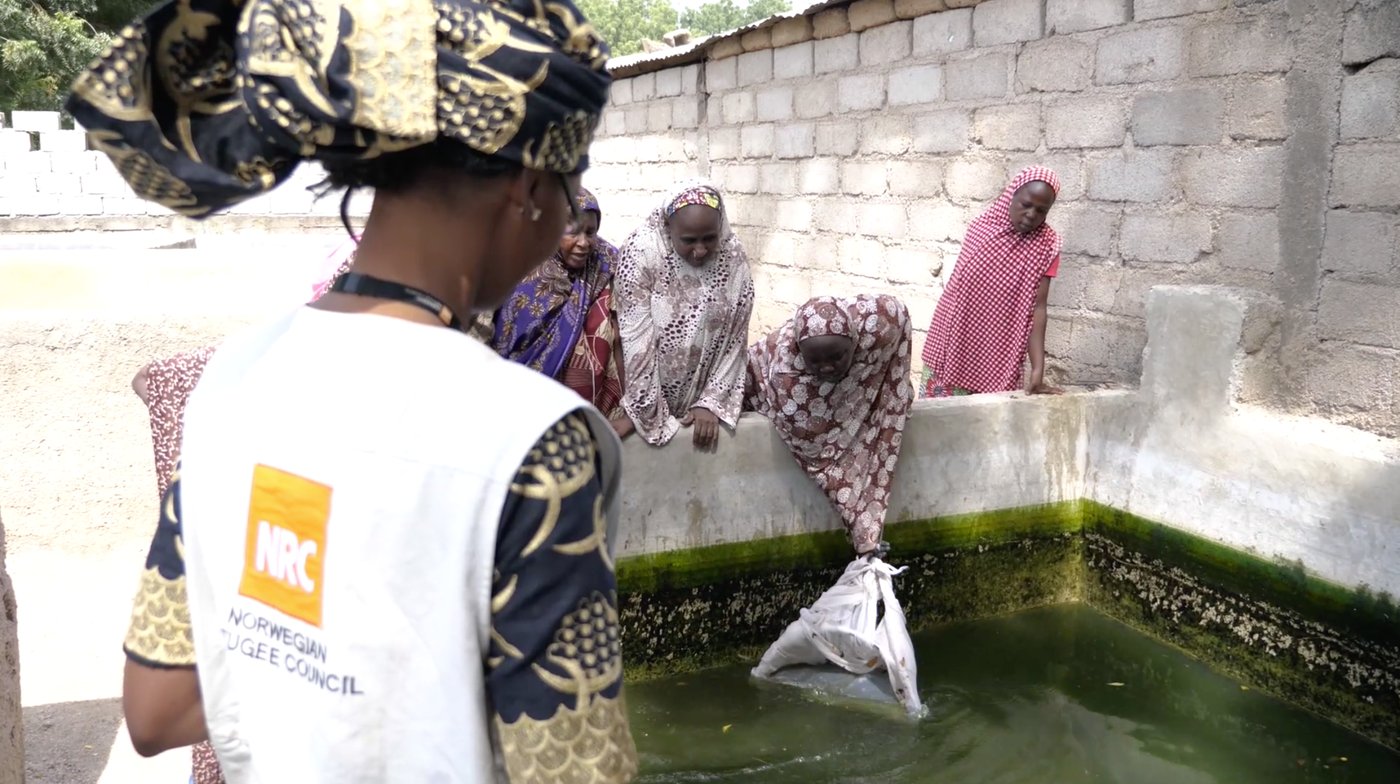
Forretningsutvidelse
Da Flyktninghjelpens team i Mora ble oppmerksom på foreningen som Boucar Adji hadde stiftet, var vi glade for å kunne samarbeide med ham.
– Vi visste at hvis vi gav støtte til denne oppdrettsvirksomheten, så ville hele lokalsamfunnet ha nytte av det. Adji ventet ikke bare på at frivillige organisasjoner skulle hjelpe lokalsamfunnet. Han hadde allerede en klar idé om hvordan foreningen hans kunne gjøre det selv, forteller Leila Hommal, en av Flyktninghjelpens ansatte i området.
Med den økonomiske støtten som han fikk fra Flyktninghjelpen, var Adji i stand til å utvide virksomheten. Han bygde en ny dam og ansatte assistenter som hjalp ham med å rense dammene og mate fiskene. Alle assistentene er kvinner som har flyktet til Mora. En av dem er Halima.
– Da oppdrettsforeningen spurte om jeg ville jobbe med dem, takket jeg ja, sier Halima. – Jobben min er å rense dammene og mate fiskene sammen med de andre medlemmene i foreningen.
Uten symaskinen og andre midler til å forsørge familien, var hun takknemlig for muligheten. Halima får lønn for arbeidet sitt på oppdrettsanlegget. Men som medlem er ikke dét alt hun mottar. Hun og de andre medlemmene i foreningen får også fisk til å ta med seg hjem. Nå kan Halima og familien spise fersk fisk jevnlig.
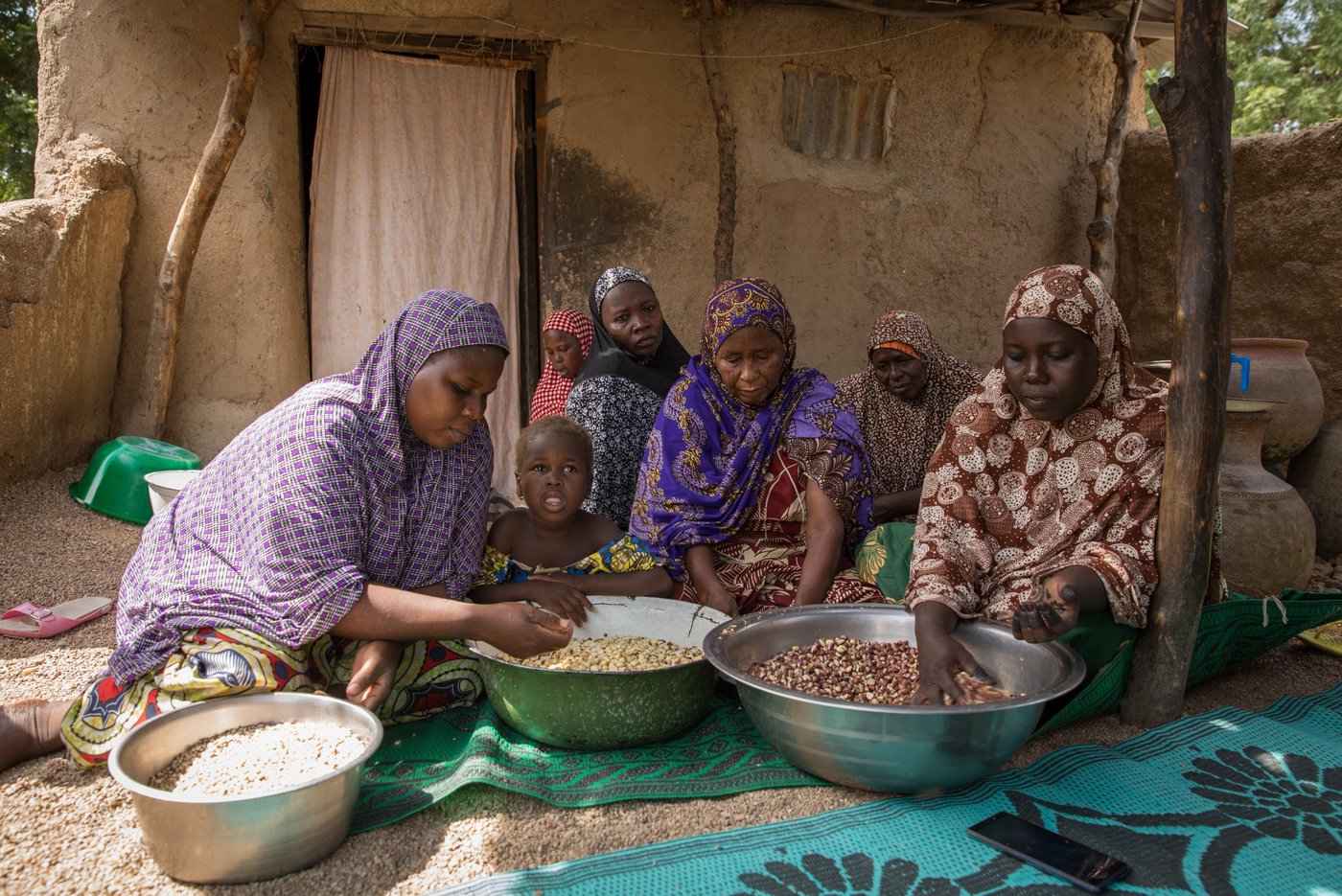
To inntektskilder
I tillegg til å gi økonomisk støtte til foreningen, sørget vi også for økonomisk hjelp direkte til noen av de mest vanskeligstilte familiene i Mora. Halima brukte disse pengene til å kjøpe hirse og peanøtter som hun selger.
– Nå har jeg, ved Guds nåde, to inntektskilder – fiskeoppdrett og salg av peanøtter, forklarer hun. – Og det er på grunn av dette at jeg er i stand til å brødfø familien min og sørge for barnas behov.
Halima er stolt av det hun har klart å oppnå. Hun forteller at det daglige arbeidet hennes på oppdrettsanlegget og stabiliteten det har gitt henne, har hjulpet henne med å glemme mye av det vanskelige hun har vært igjennom.
Bærekraftig støtte
Arbeidet vårt for å sikre matsikkerhet og nye inntektskilder for de som har måttet flykte fra hjemmene sine i Kamerun, innebærer å gi støtte til lignende foreninger i andre områder. Vi har gitt støtte til grupper som er involvert i husdyrhold og andre som er involvert i lagring og salg av gjødsel. Vi mener at det å jobbe på denne måten ikke bare er effektivt, men også bærekraftig, ettersom de lokale gruppene vi støtter vil være der lenge etter at vi er borte.


